(完整版)Einheit8情态动词完成时lassen
情态动词 时态 被动态 冠词 名词所有格 代词 从句

情态动词1. 定义情态动词是一种本身有一定的词义,但必须与动词原形(及其被动语态)一起使用,给(谓语)动词增添情态色彩,表示说话人对有关行为或事物的态度和看法,认为其可能、应该或必要等。
情态动词在句中不受任何人称,性,数变化的影响。
2. 情态动词分类①只做情态动词:must, can(could), may(might), ought to②可做情态动词又可做实义动词:need, dare③可做情态动词又可做助动词:shall(should), will(would)④具有情态动词特征:have(had,has) to, used to, had better3. 情态动词词义解释:must ①必须、必要②表示推测。
一定、肯定。
例句:You must come and renew it. 你必须来续借。
He must be mad. 他一定是疯了。
Can ①能,会。
②表示请求。
请求和允许。
例句:I can do it! 我能做到。
Can I close the window? 我能把窗户关上吗?Could ①can的过去式②也可表示请求,语气委婉例句:We could speak to Felix yesterday. 昨天我们可以和Felix谈话。
Could I use your phone? 让我用一下你的电话好吗?May可以例句:May I have your name? 我可以知道你的名字吗?Might ①may的过去式②表示虚拟语气, 使语气更加委婉, 客气例句:We might go to the park last week. 上周我们可以去公园。
Might I make a suggestion? 我可以提个建议吗?ought to 应该,应当例句:You ought to take care of him. 我们应当多照顾他。
need 需要例句:Need I hand in the homework this week?本周我需要递交作业吗?dare 敢例句:Dare she go to school by herselve? 她敢自己去上学吗?shall应当,应该例句:What shall we do this morning? 今天早上我们应该做什么?should 应该例句:We should do exercise in the morning. 早上我们应该晨练。
九年级英语unit 8 语法(情态动词)A4
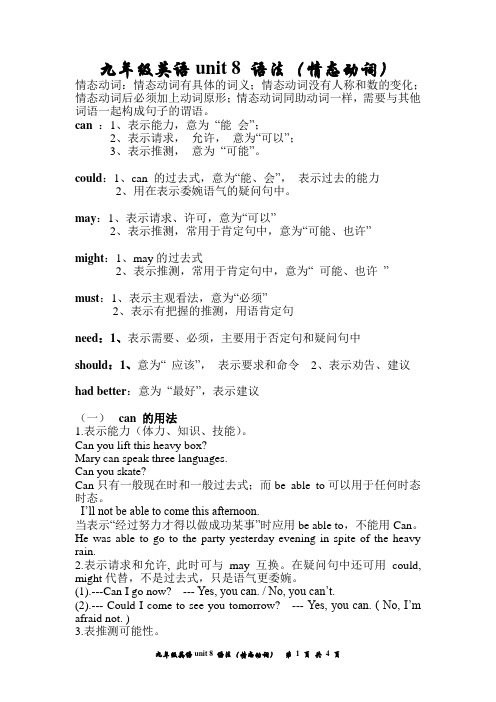
九年级英语unit 8 语法(情态动词)情态动词:情态动词有具体的词义;情态动词没有人称和数的变化;情态动词后必须加上动词原形;情态动词同助动词一样,需要与其他词语一起构成句子的谓语。
can:1、表示能力,意为“能会”;2、表示请求,允许,意为“可以”;3、表示推测,意为“可能”。
could:1、can 的过去式,意为“能、会”,表示过去的能力2、用在表示委婉语气的疑问句中。
may:1、表示请求、许可,意为“可以”2、表示推测,常用于肯定句中,意为“可能、也许”might:1、may的过去式2、表示推测,常用于肯定句中,意为“ 可能、也许”must:1、表示主观看法,意为“必须”2、表示有把握的推测,用语肯定句need:1、表示需要、必须,主要用于否定句和疑问句中should:1、意为“ 应该”,表示要求和命令2、表示劝告、建议had better:意为“最好”,表示建议(一)can 的用法1.表示能力(体力、知识、技能)。
Can you lift this heavy box?Mary can speak three languages.Can you skate?Can只有一般现在时和一般过去式;而be able to可以用于任何时态时态。
I’ll not be able to come this afternoon.当表示“经过努力才得以做成功某事”时应用be able to,不能用Can。
He was able to go to the party yesterday evening in spite of the heavy rain.2.表示请求和允许, 此时可与may互换。
在疑问句中还可用could, might代替,不是过去式,只是语气更委婉。
(1).---Can I go now? --- Yes, you can. / No, you can’t.(2).--- Could I come to see you tomorrow? --- Yes, you can. ( No, I’m afraid not. )3.表推测可能性。
德语 lassen 用法

lassen als VollverbLass das! 算了吧!别干了!Du sollst das Rauchen lassen! 别再抽烟了!把烟戒掉吧!Verdammt, ich habe dn Schlüssel im Auto gelassen. 真该死,我把钥匙落在汽车里了。
Wir lassen heute den Wagen in der Garege und machen eine Radtour . 今天我们不开车,骑自行车出去兜风。
Im Kaufhaus haben wir heute mehrere hundert Euro gelassen . 今天我们在百货公司花了好几百欧元。
Wo habe ich nur meinen Pass gelassen? 我把护照放哪儿去了?Lass diese Scherz / den Lärm / das Weinen ! 别开玩笑了/别吵闹了/别再哭了!Lass diesen Blödsinn ! 别犯傻了!Lass endlich die Katze aus dem Sack ! 快讲讲您的真实想法吧!/快讲讲事情的真相吧!Du sollst die Kinder in Ruhe lassen / Lass mich in Ruhe ! 你就随孩子们去吧(别管孩子们)。
/别烦我!Lass alles so , wie es ist! 就让事情这样吧。
Lassen wir alles beim Alten! 让一切都照旧吧!Bei aller Begeisterung , man sollte die Kirche im Dorf lassen . 不管多么高兴都应该一是一,二是二(切莫言过其实)。
Die SPD musste bei der Landtagswahl Federn lassen . 社民党在州议会选举中失去了很多选票。
八年级上册英语情态动词(完整版)含答案
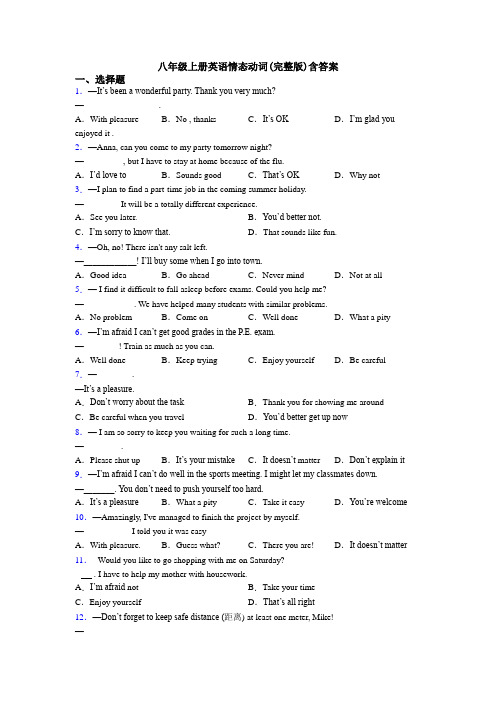
八年级上册英语情态动词(完整版)含答案一、选择题1.—It’s been a wonderful party. Thank you very much?—- ________________.A.With pleasure B.No , thanks C.It’s OK D.I’m glad you enjoyed it .2.—Anna, can you come to my party tomorrow night?—_________, but I have to stay at home because of the flu.A.I’d love to B.Sounds good C.That’s OK D.Why not 3.—I plan to find a part-time job in the coming summer holiday.—________ It will be a totally different experience.A.See you later. B.You’d better not.C.I’m sorry to know that.D.That sounds like fun.4.—Oh, no! There isn't any salt left.—____________! I’ll buy some when I go into town.A.Good idea B.Go ahead C.Never mind D.Not at all 5.— I find it difficult to fall asleep before exams. Could you help me?— ___________. We have helped many students with similar problems.A.No problem B.Come on C.Well done D.What a pity 6.—I’m afraid I can’t get good grades in the P.E. exam.—________! Train as much as you can.A.Well done B.Keep trying C.Enjoy yourself D.Be careful 7.—________.—It’s a pleasure.A.Don’t worry about the task B.Thank you for showing me around C.Be careful when you travel D.You’d better get up now8.— I am so sorry to keep you waiting for such a long time.— ________.A.Please shut up B.It’s your mistake C.It doesn’t matter D.Don’t explain it 9.—I’m afraid I can’t do well in the sports meeting. I might let my classmates down.—_______. You don’t need to push yourself too hard.A.It’s a pleasure B.What a pity C.Take it easy D.You’re welcome 10.—Amazingly, I've managed to finish the project by myself.—___________I told you it was easyA.With pleasure. B.Guess what? C.There you are! D.It doesn’t matter 11.--Would you like to go shopping with me on Saturday?-- . I have to help my mother with housework.A.I’m afraid not B.Take your timeC.Enjoy yourself D.That’s all right12.—Don’t forget to keep safe distance (距离) at least one meter, Mike!—________A.Sorry, I won’t.B.No, I can’t do it.C.Not at all. D.I hope not. 13.—I’m sorry. That wasn’t of much help.— ________. In fact, it was most helpful.A.Thanks anyway B.It doesn’t matter C.Of course not D.Sure it was 14.—I just got a message from Ms. Yang and she said she would come to our meeting this afternoon.— She always has good ideas.A.Why not? B.What a pity! C.Time is up. D.That’ll be very nice. 15.--Would you mind opening the window? It’s too hot.--__________.A.Sorry. I wouldn’t.B.No, of course not.C.It doesn’t matter.D.Yes, please.16.-Do you think the rain will stop tomorrow?-_____. It has rained f or four days. It’s too wet everywhere.A.I hope not B.I don’t think soC.Don’t worry D.I hope so17.— What do you think of the movie Mr. Bea ?—____. It’s very funny.A.I can’t stand it .B.I don’t mind it C.I love it. D.I hate it. 18.—Would you please help me with my spoken English?—__________. First you should know practice makes perfect.A.That’s right B.No problem C.Quite well D.No, thanks 19.—Lucy, can you help me with my history?—________. I am good at it.A.With pleasure B.I’m afraid not C.Sorry, I can’t D.No way 20.—Why not take your son to watch the new film A Little Red Flower?—__________.A.Good idea B.No problem C.Good luck D.No way 21.—I’m sorry I didn’t make it to your birthday party last night.— ________ I know you are busy recently.A.Why not? B.Don’t mention it.C.No way. D.That’s all right. 22.—Excuse me, can you give me some water? The cup is empty.—________A.Go ahead. B.My pleasure C.At your service D.You’d better not. 23.—You seem so happy today, Jack.—________? I won the first prize in the singing competition yesterday.A.So what B.How come C.Guess what D.Why not 24.—________. Where’s the nearest supermarket?—Oh, it’s about 300 meters away, next to a park.A.Thank you B.Excuse me C.Come on D.That’s OK25.–This box is too heavy for me to carry upstairs.–__________A.You may ask for help B.I’ll give you a handC.Please do me a favor D.I’d come to help26.—Many people think women are better at cooking than men.—________. Most top chefs in the world are men.A.I agree B.I ca n’t agree more C.Not at all D.That’s not the case 27.—All of Mark Twain’s novels are popular.— ________. Especially The Adventures of Tom Sawyer.A.I can’t agree more B.That’s not the case C.That’s not the point D.Don’t mention it 28.—Could you help me look after my baby ________ I am away?—________.A.as; With pleasure B.while; My pleasure C.as; That’s all right D.while; With pleasure29.—How do you find the documentary DA VID Profile(国宝档案).—________. I can’t think too highly of it.A.It all depends B.It’s really wonderfulC.No one knows for certain D.It is not my cup of tea30.—I find it really unwise to go travelling during May Day holiday.—________! Wherever you go, it’s crowded with cars and people.A.Not exactly B.Forget it C.You said it D.It depends 31.—Only those who have a lot in common can get along well.—________ Opposites sometimes attract.A.I think so. B.I don’t think so.C.I don’t care.D.I hope so. 32.—Only those who have a lot in common can get along well.—________. Opposites sometimes attract.A.I think so B.I don’t think so C.I don’t care D.I hope so 33.— Why will you take part in the charity walk? You are not good at running at all.— ________. I run to show that I can help others.A.Not exactly B.That’s not the point C.I can’t ag ree more D.It sounds like a pity 34.—How do you like coffee, Minnie?—It tastes very terrible. ________.A.I have no idea B.I don’t mind it C.I really can’t stand it D.I can’t afford it 35.—________!—Yes. It sounds gentle and relaxing.A.How good the vegetable soup is B.How exciting the storybook isC.What nice music Ann is playing D.What a beautiful flower Jim keeps 36.—How about putting some pictures into the report?—________ A picture is worth a thousand words.A.I don’t think so.B.Why not?C.Thank you. D.Don’t mention it.37.—The game is too hard for me. I will certainly lose.—________. You should never say no before you try.A.Forget it! B.Come on! C.I’m sorry.D.Pardon me? 38.—I wonder if Tenny is doing well in her new school.—________. She is old enough to look after herself well.A.You’re welcome B.Good luck C.It’s a pity D.No need to worry 39.—Why don’t you join in a club to practise speaking English?—________.A.That’s a good idea B.Never mind C.Yes, please D.Thank you 40.—Summer camping gives children the chance to live away from home.—________. It is always good to help children grow up.A.That’s true.B.Come this way. C.Let me have a look. D.I don’t think we agree.41.— Would you mind my turning on the TV? The New Year concert has just begun.— ________. Just go ahead.A.Please don’t B.Better not C.Of course not D.I’m afraid not 42.—I prefer to chat online. I’ve got to know many friends on the Internet.—________. Few of them would become your real friends.A.I can’t agree more B.I’m ple ased to know thatC.That’s for sure D.That’s not the case43.—I visited the Purple Mountain Observatory by myself last Saturday.—________ Why didn’t you tell me earlier?A.You did? B.I hope not. C.Have a good time. D.I can’t believe it. 44.—Mum, Joe has broken a cup!—________. Accidents always happen.A.Pretty good B.Of course C.It doesn’t matter D.That depends 45.—We’ll study in different schools next term. I hope you’ll enjoy your time in the new school!—________A.I’ll take your advice. B.The same to you. C.Congratulations!D.It doesn’t matter.46.— The movie Lost in Russia sends a message about the importance of family.— ________. It reminds me of my parents.A.I hope so B.That’s all right C.You bet D.I don’t think so 47.— The dress I got is not the same color as that is shown online.—________? But if so, I promise we will send you another one.A.How come B.Who knows C.What for D.Why worry 48.—Another Friday! Let’s go to see the play tonight.—________ I will book the tickets online.A.My pleasure. B.That’s right.C.Why not? D.Never mind. 49.—Can I look at the menu for a few more minutes before I decide?—Of course. ________, Sir.A.Make yourself at home B.Enjoy yourself C.It doesn’t matterD.Take your time50.—How about buying that coat?—________. It’s too expensive. I can’t afford it.A.That sounds good B.No way C.Good idea D.What a pity【参考答案】***试卷处理标记,请不要删除一、选择题1.D【详解】根据情景反应,可知答案为D解析:D【详解】根据情景反应,可知答案为D2.A【详解】句意:——安娜,你能来参加我明晚的聚会吗?——我很想去,但是因为流感我不得不呆在家里。
lassen的变位

lassen的变位1. 引言在生活中,我们常常遇到各种变化和转变。
而”lassen的变位”则是指德语中动词”lassen”的不同形式和变化。
“lassen”是一个非常常用的动词,它具有多种用法和含义。
在本文中,我们将深入探讨”lassen”的变位形式以及不同用法,帮助读者更好地理解和运用这个动词。
2. “lassen”的基本形式“lassen”是一个弱动词,其基本形式为”lassen”。
在德语中,动词的变位形式主要包括人称、时态、语气和语态等方面的变化。
下面将详细介绍”lassen”在不同变位下的形式和用法。
2.1 现在时在现在时态中,“lassen”的变位形式如下:•ich lasse (我让)•du lässt (你让)•er/sie/es lässt (他/她/它让)•wir lassen (我们让)•ihr lasst (你们让)•sie lassen (他们/她们/它们让)2.2 过去时在过去时态中,“lassen”的变位形式如下:•ich ließ (我让)•du ließest (你让)•er/sie/es ließ (他/她/它让)•wir ließen (我们让)•ihr ließt (你们让)•sie ließen (他们/她们/它们让)2.3 将来时在将来时态中,“lassen”的变位形式如下:•ich werde lassen (我将要让)•du wirst lassen (你将要让)•er/sie/es wird lassen (他/她/它将要让)•wir werden lassen (我们将要让)•ihr werdet lassen (你们将要让)•sie werden lassen (他们/她们/它们将要让)3. “lassen”的用法除了变位形式外,“lassen”还有多种用法和含义。
(完整版)初中情态动词用法总结

一情态动词的用法和辨析,情态动词表示推测和可能,由情态动词引导的一般疑问句的回答。
二 1 只是情态动词: can, could, may, might, must2 可做情态动词,可做实义动词: need, dare3 可做情态动词,可做助动词: will, would, shall, should4 特殊: have to, ought to, used to三 1 有一定的词义,但不能单独作谓语,必须与行为动词和系动词连用构成谓语。
2 无人称和数的变化。
( have to 除外)Eg: He has to stay here.3 后接动词原形。
4 具有助动词作用,可构成否定,疑问或简短回答。
四① 表示能力,“能,会”。
Eg : Can you play basketball?② 表示怀疑,猜测,常用于否定句或疑问句。
Eg :Li hua can’t be in the classroom.③ 表示请求,允许,多用于口语,译“可以”= may.Eg: youcangonow.④can 开头的疑问句,肯定句,否定句用 can 或 can’t.①can 的过去式,表示过去的能力。
Eg :I could swim when I was seven years old.②could 开头的疑问句,肯定和否定回答用 could, couldn’ t 如果 could 表示现在的委婉,用 can 回答。
Eg: Could I have a drink? Yes, you can.① 表示推测,“可能,也许”,用于肯定句。
Eg: He may come tomorrow.② 表示请求,“许可,可以”。
Eg: May I borrow your book?注:表示请求,许可时,主语为第一人称的一般疑问句,否定回答用 mustn’t“不可以,禁止,不许”,不用may not“可能不”。
③表示祝愿。
Eg :May you success.①表示“可以”,用于过去时中。
高一英语语法情态动词知识点
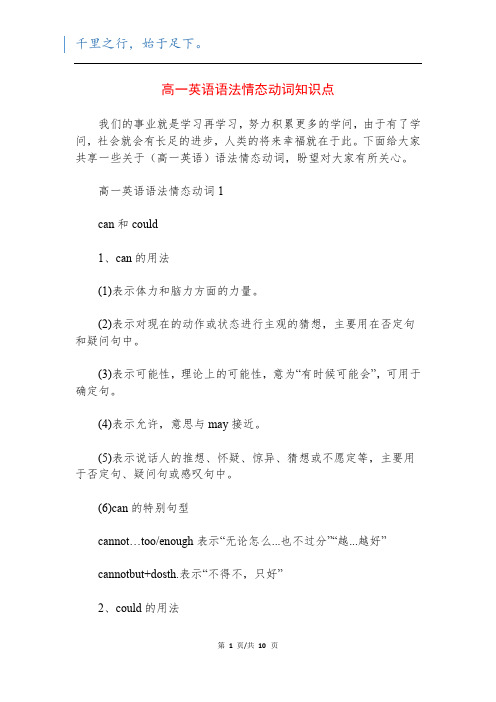
高一英语语法情态动词知识点我们的事业就是学习再学习,努力积累更多的学问,由于有了学问,社会就会有长足的进步,人类的将来幸福就在于此。
下面给大家共享一些关于(高一英语)语法情态动词,盼望对大家有所关心。
高一英语语法情态动词1can和could1、can的用法(1)表示体力和脑力方面的力量。
(2)表示对现在的动作或状态进行主观的猜想,主要用在否定句和疑问句中。
(3)表示可能性,理论上的可能性,意为“有时候可能会”,可用于确定句。
(4)表示允许,意思与may接近。
(5)表示说话人的推想、怀疑、惊异、猜想或不愿定等,主要用于否定句、疑问句或感叹句中。
(6)can的特别句型cannot…too/enough表示“无论怎么...也不过分”“越...越好”cannotbut+dosth.表示“不得不,只好”2、could的用法(1)表示力量,指的是过去时间。
(2)表示允许,指的是过去时间。
(3)表示可能,可以指过去时间,也可以指现在时间,表示语气缓和。
(4)委婉客气地提出问题或陈述看法,指的是现在时间。
主要用于疑问句,回答时用can。
3、can与could的区分can表推想时只用于否定句和疑问句(could无此限制)。
couldn’t 的可能性比can’t小。
4、can与beableto的区分(1)现在时:无区分,但后者不常用。
(2)完成时;can没有完成时,此时要用have(has,had)beenableto。
(3)将来时:can没有将来时,要用willbeableto。
(4)过去时:could表示一般力量,was/wereableto表示在详细场合通过努力胜利做成某事的力量。
高一英语语法情态动词2二、may和might1、may的用法(1)表示询问或说明一件事可不行以做。
(2)表示一件事或许会发生或某种状况可能会存在,通常用在确定句和否定句中。
留意:表示可能性时,can’t语气强,表示“不行能”,maynot语气弱,表示“可能不”。
德语高频动词lassen

"lassen"这个动词⼀直都⾮常重要,他主要有两个意思: 1)=veranlassen ,auffordern 表⽰"促使、要求、引起、安排" z.B.Der Richter veranlasst ,dass ein Justizbeamter die Fenster oeffnet. -> Der Richter laesst einen Justizbeamter die Fenster oeffnen. 2)=erlauben, zulassen 表⽰"允许、许可" z.B.Die Eltern haben ihrem Sohn erlaubt, dass er mit anderen Kindern herumtobt. -> Die Eltern haben ihren Sohn… herumtoben. lassen有两种⽤法: 1)作为情态动词,在构成完成时动词的变位要按情态动词变。
sich lassen + Inf. = koennen + PII + werden z.B.Der Einbrecher hatte zugelassen, dass… -> Der Einbrecher hatte sich … lassen. Er hat sich von ihr die Haare schneiden lassen. 2)作为实义动词,构成完成时动词的变位按⼀般动词变。
z.B.Ich habe meine Tasche zu Hause gelassen. 给出由lassen构成派⽣的其他动词,供⼤家参考: auslassen vt.放出、熔化、忽略、发泄 hinterlassen vt.留下、遗留 einlassen vt.准许…进⼊,把…放⼊ sich auf etwas /j-n einlassen 参与,从事 hinueberlassen offenlassen zulassen 邀请 verlassen 离开 zuruecklassen hineinlassen auflassen anlassen erlassen ueberlassen zerlassen weglassen 你知道上⾯动词的意义吗?。
(完整版)Einheit9主动态和被动态

别由sein的现在时和过去时加上不定式构成。
• Der Lehrer kann nicht verstanden werden. • Der Lehrer ist nicht zu verstehen. • Der Text muss übersetzt werden. • Der Artikel ist zu übersetzen. • Der Fernseher kann repariert werden. • Der Fernseher muss repariert werden. • Der Fernseher ist zu reparieren. • Die Wohnung musste aufgeräumt werden. • Die Wohnung war aufzuräumen. GÜ 1
• D) 用man 做主语 • Man fragt das Kind. • Das Kind wird gefragt. • • Man arbeitet am Sonntag nicht. • Es wird am Sonntag nicht gearbeitet. • • Man hat das Haus vor 100 Jahren gebaut. • Das Haus ist vor 100 Jahren gebaut worden.
• GÜ 4, 5
将下列句子改为被动态
• 1 . Herr Baumann bat mich, bei diese Arbeit mitzumachen.
• Ich wurde gebeten, bei diese Arbeit mitzumachen. • 2. Seine Verspätung迟到 hat unseren Plan 妨碍gestört. • 3. Können wir die Produktion ohne Probleme
《大学德语》课程教学大纲(本科)
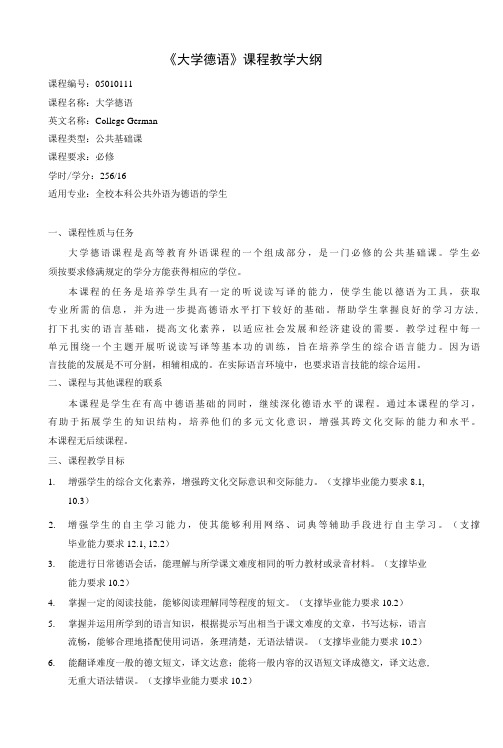
《大学德语》课程教学大纲课程编号:05010111课程名称:大学德语英文名称:College German课程类型:公共基础课课程要求:必修学时/学分:256/16适用专业:全校本科公共外语为德语的学生一、课程性质与任务大学德语课程是高等教育外语课程的一个组成部分,是一门必修的公共基础课。
学生必须按要求修满规定的学分方能获得相应的学位。
本课程的任务是培养学生具有一定的听说读写译的能力,使学生能以德语为工具,获取专业所需的信息,并为进一步提高德语水平打下较好的基础。
帮助学生掌握良好的学习方法, 打下扎实的语言基础,提高文化素养,以适应社会发展和经济建设的需要。
教学过程中每一单元围绕一个主题开展听说读写译等基本功的训练,旨在培养学生的综合语言能力。
因为语言技能的发展是不可分割,相辅相成的。
在实际语言环境中,也要求语言技能的综合运用。
二、课程与其他课程的联系本课程是学生在有高中德语基础的同时,继续深化德语水平的课程。
通过本课程的学习,有助于拓展学生的知识结构,培养他们的多元文化意识,增强其跨文化交际的能力和水平。
本课程无后续课程。
三、课程教学目标1.增强学生的综合文化素养,增强跨文化交际意识和交际能力。
(支撑毕业能力要求8.1,10.3)2.增强学生的自主学习能力,使其能够利用网络、词典等辅助手段进行自主学习。
(支撑毕业能力要求12.1, 12.2)3.能进行日常德语会话,能理解与所学课文难度相同的听力教材或录音材料。
(支撑毕业能力要求10.2)4.掌握一定的阅读技能,能够阅读理解同等程度的短文。
(支撑毕业能力要求10.2)5.掌握并运用所学到的语言知识,根据提示写出相当于课文难度的文章,书写达标,语言流畅,能够合理地搭配使用词语,条理清楚,无语法错误。
(支撑毕业能力要求10.2)6.能翻译难度一般的德文短文,译文达意;能将一般内容的汉语短文译成德文,译文达意,无重大语法错误。
(支撑毕业能力要求10.2)7.德语能力达到大学德语四级水平。
8上英语情态动词专项讲解
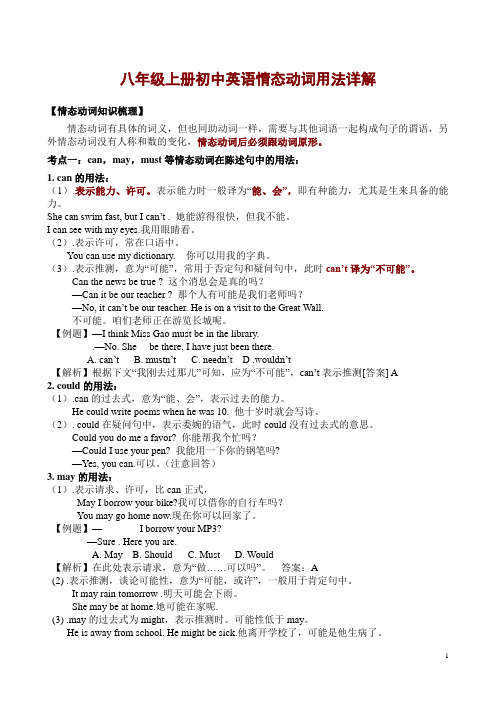
八年级上册初中英语情态动词用法详解【情态动词知识梳理】情态动词有具体的词义,但也同助动词一样,需要与其他词语一起构成句子的谓语,另外情态动词没有人称和数的变化,情态动词后必须跟动词原形。
考点一:can,may,must等情态动词在陈述句中的用法:1. can的用法:(1).表示能力、许可。
表示能力时一般译为―能、会”,即有种能力,尤其是生来具备的能力。
She can swim fast, but I can’t . 她能游得很快,但我不能。
I can see with my eyes.我用眼睛看。
(2).表示许可,常在口语中。
You can use my dictionary. 你可以用我的字典。
(3).表示推测,意为―可能‖,常用于否定句和疑问句中,此时can’t译为“不可能”。
Can the news be true ? 这个消息会是真的吗?—Can it be our teacher ? 那个人有可能是我们老师吗?—No, it can’t be our teacher. He is on a visit to the Great Wall.不可能。
咱们老师正在游览长城呢。
【例题】—I think Miss Gao must be in the library..—No. She __be there, I have just been there.A. can’tB. mustn’tC. needn’t D .wouldn’t【解析】根据下文―我刚去过那儿‖可知,应为―不可能‖,can’t表示推测[答案] A2. could的用法:(1).can的过去式,意为―能、会‖,表示过去的能力。
He could write poems when he was 10. 他十岁时就会写诗。
(2). could在疑问句中,表示委婉的语气,此时could没有过去式的意思。
Could you do me a favor? 你能帮我个忙吗?—Could I use your pen? 我能用一下你的钢笔吗?—Yes, you can.可以。
Einheit 8情态动词完成时 lassen

Was passt zusammen?
• den Wasseቤተ መጻሕፍቲ ባይዱhahn
• trinken
• dmweltfreundliche Waschmittel • Zudrehen
• wiederaufladbare Batterien
• bringen
• vorsichtig mit der Umwelt
• Ich habe mein Buch auf dem Tisch gelassen.. • Die Eltern haben die kleinen Kinder nicht allein zu
Hause gelassen. • Er hat das Kind nicht auf die Straße gelassen.
• Mein Freund hat Computer gespielt. Aber ich habe das nicht gedurft.
• Ich bin nicht ins Kino gegangen. Ich musste Hausaufgaben machen.
• Ich bin nicht ins Kino gegangen. Ich habe Hausaufgaben machen müssen.
Computer spielen. • GÜ2, 3 • Der Chef arbeitet nicht. Er lässt... • Der Lehrer macht die Übung nicht. • Der Vater kocht nicht. • Die Frau räumt die Wohnung nicht. • Wir waschen die Wäsche nicht. • Er kauft nicht ein.
德语动词Lassen
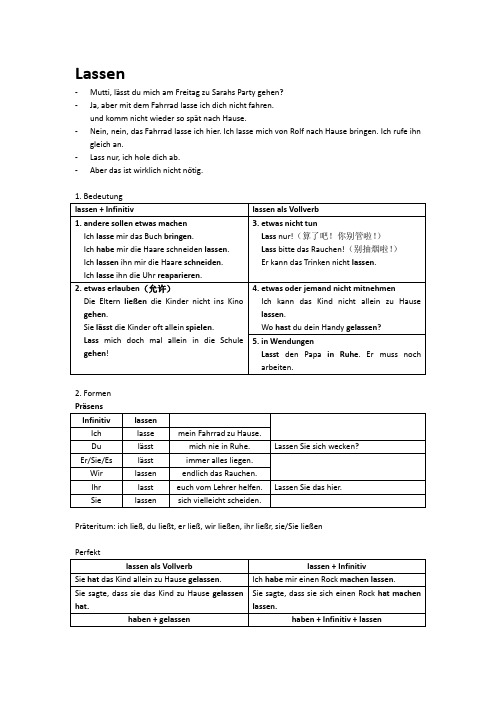
Lassen-Mutti, lässt du mich am Freitag zu Sarahs Party gehen?-Ja, aber mit dem Fahrrad lasse ich dich nicht fahren.und komm nicht wieder so spät nach Hause.-Nein, nein, das Fahrrad lasse ich hier. Ich lasse mich von Rolf nach Hause bringen. Ich rufe ihn gleich an.-Lass nur, ich hole dich ab.-Aber das ist wirklich nicht nötig.2. FormenPräteritum: ich ließ, du ließt, er ließ, wir ließen, ihr ließr, sie/Sie ließenSchreiben Sie die Bedeutungen 1-5 in die Klammern und übersetzen Sie dann die Sätze ins Chinesische.a) Die Eltern lassen die Kinder nur samstagabends fernsehen. ( )______________________________________________________________________________ b) Die Briefe habe ich meine Sekretärin beantworten lassen. ( )______________________________________________________________________________ c) Die Kinder stellten der Oma viele Fragen und ließen sie nicht in Ruhe. ( )______________________________________________________________________________ d) Als ich zahlen wollte, merkte ich, dass ich mein Geld zu Hause gelassen hatte.( )______________________________________________________________________________ e) Heute ist doch Samstag. Lass mich noch ein bisschen schlafen! ( )______________________________________________________________________________lassen oder gelassena) - Dein Auto ist ganz schön sauber.- Ja,ich habe es gestern waschen _____________.b) - Du hast aber eine schöne Frisur.- Danke, ich habe mir gestern die Haare schneiden ____________.c) - Zu dumm! Ich finde meine Brille nicht.- Hast du sie vielleicht im Hörsaal ______________ ?d) - Du hast doch gesagt, dass du deine Tochter mitbringst.- Ich habe sie zu Hause ____________, weil sie ein wenid erkältet ist.e) - Sind Sie alleinerziehende Mutter?- Ja, vor zwei Jahren habe ich mich scheiden ____________.Notebook/ im Büro-Nimmsst du das Notebook mit?-Nein, das lasse ich im Büro.Regenmantel/zu Hause; Kamera/ bei dir; Kassettenrecorder/ im Studentenheim;Kalender/im Büro; Katze/ bei einem Freund; Zeitschriften/in der Bibliopthek。
Unit8Grammar语法情态动词九年级英语全一册单元语法(人教版)

班级姓名学号分数Unit 8 It must belong to Carla.情态动词(时间:60分钟,满分:100分)情态动词可以表示说话的语气,本单元我们主要学了must,might,could,can等情态动词表示推测的用法。
表示推测时,要根据肯定句、疑问句或否定句的不同句式选用不同的情态动词。
一、情态动词表推测时,不同的形式表示不同的时态。
二、情态动词表推测的意义和用法She can’t be at school. It’s Sunday today.她不可能在学校里。
今天是星期天。
【警示】1. could用于否定句时,语气较can’t缓和,意为"不可能"。
►He said the news couldn’t be true.他说那个消息不可能是真的。
2. may/might用于否定句时,表示不太有把握的否定推测,意为"可能不"。
一、单项选择(本大题共50小题,每小题2分,共100分)1.(2023·黑龙江哈尔滨·统考中考真题)In order to keep our environment clean and tidy, we ________ throw rubbish into the bins (垃圾箱).A.mustn’t B.can’t C.must2.(2023·山东菏泽·统考中考真题)—Where are you going this summer vacation?—I ________ go to Zibo, but I’m not sure.A.must B.needn’t C.might3.(2023·江苏宿迁·统考中考真题)According to the traffic rules, people ________ ride ebikes without wearing helmets.A.mustn’t B.needn’t C.may not D.might not4.(2023·辽宁抚顺·统考中考真题)The lovely boy ________ ride the bike at the age of six.A.must B.could C.need D.should5.(2023·吉林长春·统考中考真题)This _______ be Alice’s guitar. Hers is still in my house.A.should B.can’t C.must D.needn’t6.(2023·黑龙江牡丹江·统考中考真题)— Is that boy in a white shirt over there Leo?— No, it ________ be him. He has gone to Kunming.A.must B.can’t C.might7.(2023·辽宁·统考中考真题)—Is this red jacket Tony’s?—No, it ________ be his. He doesn’t like red.A.can’t B.mustn’t C.needn’t D.wouldn’t8.(2023·广西·统考中考真题)—Can you speak English, Lingling?—Yes. I ________.A.must B.can C.should9.(2023·湖北孝感·统考中考真题)— How beautiful the paper cutting is! Who made it?— It ________ be Linda. She’s the only one that can make it in our class.A.must B.would C.can D.could10.(2023·湖南株洲·统考中考真题)The toy truck ________ belong to Jane’s little brother. He was the only little kid at the picnic.A.must B.can’t C.could11.(2023·四川乐山·统考中考真题)—Excuse me, how can I get to the nearest hospital?—Go straight and walk into Renmin Rood. You ________ miss it. It’s opposite the bank.A.can’t B.needn’t C.mustn’t12.(2023·湖北荆州·统考中考真题)—You _______ take the subway to the airport, for I can drive you there directly.—That’s very kind of you.A.can’t B.needn’t C.mustn’t D.shouldn’t13.(2023·湖北武汉·统考中考真题)—Excuse me, but we ________ wait in line to get on the subway.—I’m sorry.A.might B.would C.could D.should14.(2023·山东滨州·统考中考真题)—The paper cutting is pretty lively. Who made it?—It ________ be Mary. None of us except her is able to do it.A.can B.must C.need D.might15.(2023·天津·统考中考真题)—Would you like to visit Tianjin University tomorrow?—Sorry, I’m afraid I ________. I’ll work as a volunteer in my munity.A.can B.can’t C.must D.mustn’t16.(2023·江苏连云港·统考中考真题)Earthquakes can be very dangerous. We ________ learn to protect ourselves.A.might B.should C.could D.would17.(2022·青海·统考中考真题)—Look! Mr. Li is playing basketball with his students.—It ________ be him. He has gone to Xi’an.A.mustn’t B.can’t C.shouldn’t18.(2022·西藏·统考中考真题)You ________ be tired after the whole day’s work.A.must B.should C.can D.would19.(2022·贵州黔西·统考中考真题)The headmaster often tells us that students ________ go to swim in rivers by themselves. It’s quite dangerous.A.mustn’t B.must C.couldn’t D.could20.(2022·山东济南·统考中考真题)—Is the girl over there Lucy?—No. It ________ be her. She is cleaning the classroom.A.must B.could C.can’t D.mustn’t21.(2022·辽宁大连·统考中考真题)—Wilson, ________ you help me carry the box upstairs?—Sure, no problem.A.could B.need C.should D.might22.(2022·广西玉林·统考中考真题)—Hey, whose basketball do you think this is?—It ________ belong to Linda. She likes playing basketball best in our class.A.must B.can C.mustn’t D.can’t23.(2023·黑龙江哈尔滨·统考模拟预测)—Wilson, ________ you help me carry the box upstairs?—Sure, no problem.A.could B.should C.might24.(2023·黑龙江哈尔滨·模拟预测)—May I put my bike here?—No, you________. It is for the shared bikes. Put it over there, please.A.mustn’t B.won’t C.needn’t25.(2023·黑龙江哈尔滨·哈尔滨市第六十九中学校校考模拟预测)—Mom, ________ I eat the sandwiches now?—No. You must set the table first.A.must B.may C.should26.(2023·黑龙江哈尔滨·模拟预测)—According to our school rules, teenagers ________ be allowed to smoke in the school.—So it is. We should pay attention to teaching the children to develop good habits.A.shouldn’t B.needn’t C.mustn’t27.(2023·福建福州·福建省福州第一中学校考模拟预测)—Dad, must I do my homework now?—No, you ________. You can play games with your friends for a little while.A.can’t B.needn’t C.may28.(2023·吉林长春·统考模拟预测)The novel ________ be Jack’s. He doesn’t like novels at all.A.mustn’t B.may not C.can’t D.needn’t29.(2023·黑龙江哈尔滨·一模)— Riding to work has bee popular now.— It ________ be. It’s not only convenient but also a green way of life.A.must B.can C.should30.(2023·黑龙江哈尔滨·模拟预测)—Tibetan children from the Children’s Home of Yushu Qianghai ________ be happy on Children’s Day.—That’s true. They had fun visiting the Palace Museum in BeijingA.need B.must C.can’t31.(2023·安徽宣城·安徽省宣城市第三中学校考模拟预测)—On my way to the bookstore, I saw Sally hanging out with her mom.—It ________ be Sally. She’s having a piano lesson.A.mustn’t B.can’t C.needn’t D.won’t32.(2023·安徽·校联考模拟预测)Your answer ________ be right, but I’m going to ask teacher to make sure.A.might B.can’t C.must D.needn’t33.(2023·福建福州·福建省福州延安中学校考三模)With the AI lock, you ________ take keys with you anymore. Isn’t it cool?A.shouldn’t B.can’t C.needn’t34.(2023·福建福州·福州三牧中学校考三模)—Must I be a teacher like you when I grow up, Dad?—No, you ________. You can choose whatever job you want to do.A.can’t B.mustn’t C.needn’t35.(2023·吉林长春·统考一模)—Is this basketball Wang Dong’s?—It ________ be his. He never plays basketball.A.can B.can’t C.must D.mustn’t36.(2023·内蒙古呼伦贝尔·统考一模)The book ________ be Mary’s. We can see her name on it.A.must B.need C.can’t D.needn’t37.(2023·吉林长春·长春市解放大路学校校考二模)The lady there __________ be Judy. I saw her cooking in the kitchen just now.A.mustn’t B.needn’t C.can’t D.shouldn’t38.(2023·福建福州·统考模拟预测)You ________ return the book today. You may give it back in a week.A.can’t B.mustn’t C.needn’t39.(2023·福建厦门·厦门一中校考二模)—Robot, could you wash the car for me?—Yes, I ________. I’m ing, dad.A.can B.could C.can’t40.(2023·福建厦门·厦门双十中学校考二模)In the library you ________ draw or write in the books, or you will be fined.A.mustn’t B.needn’t C.wouldn’t41.(2023·重庆沙坪坝·重庆一中校考一模)—Whose exercise book could it be?—It ________ be Andy’s. His handwriting is much better.A.must B.can’t C.might D.mustn’t42.(2023·湖北襄阳·统考二模)—The paper cutting is so beautiful, who made it?—It ________ be Sun Yi. None of us except her is able to cut it.A.must B.might C.could D.can’t43.(2023·福建三明·统考二模)The students are lying on the grass after the football match. They ________ be very tired.A.must B.should C.can44.(2023·安徽阜阳·统考二模)—We _________ work hard as a team, or we will fail for a second time.—Yes. Just as the saying goes, “One finger can’t lift a small stone.”A.can B.can’t C.must D.mustn’t45.(2023·安徽马鞍山·校联考一模)—Will you go to the cinema with me this evening?—Sorry, I ________. I haven’t finished my homework yet.A.mustn’t B.needn't C.can’t D.couldn’t46.(2023·安徽黄山·统考一模)—Hurry up, Jeff! Let’s cross the road as fast as possible.—No, you ________. Don’t you see the light is still red?A.couldn’t B.wouldn’t C.mustn’t D.needn’t47.(2023·黑龙江·校联考一模)—It ________ be Jim, for the light of his room is on.—It ________ be him. He has gone to Beijing on business.A.can; must B.must; can’t C.may; mustn’t48.(2023·甘肃平凉·统考一模)—Where is Lucy? I can’t find her anywhere.—She ________ be in the library. She loves reading books when she is free.A.must B.need C.can’t D.shouldn’t49.(2023·福建龙岩·统考一模)—Where is Mom now?—I’m not sure. She ________ be in the kitchen.A.may B.need C.must50.(2023·吉林松原·统考一模)—Who’s the girl under the tree?—I’m not sure. She________ be Tom’s sister.A.may B.can’t C.must参考答案:1.C【详解】句意:为了保持我们的环境干净整洁,我们必须把垃圾扔进垃圾箱。
初中情态动词最全讲解,从此不再害怕情态动词(值得收藏)

初中情态动词最全讲解,从此不再害怕情态动词(值得收藏)一.情态动词的用法(必须掌握)1. can 用法1)表示能力,与be able to同义,但can只用于现在时和过去时,be able to可用于各种时态。
Two eyes can see more than one.注:Can you … ? Yes, I can / No,I can’t.2).表示允许、请求用could比can 语气更加委婉客气,常用于could I /you …..?句型中,若表示同意时,用can回答而不用could .Could I borrow the book ? No, you can’t .3)。
表示推测“可能”常用于否定句或疑问句中。
(can’t表示一定不是)It can’t be true .Can it be true ?2. may 用法1)表允许,请求= can表示许可或征求对方的许可,常于第一人称连用。
注:May I ….? Yes ,you may No, you can’t / mustn’t .在回答以may引起的问句时,多避免用这个词,而用其它方式,如Yes, please. / Certainly.2)表推测,可能、也许。
常用于肯定句中。
Maybe he knows the news .=He _____ _____ the news.3. must1)表示义务。
意为“必须”(主观意志)。
We must do everything step by step.注:Must I ….? Yes, you must / No,you needn’t(don’t have to ).--Must we hand in our exercise—books now?--No, you needn’t. / No, you don’t have to.2)mustn’t 表禁止、不允许。
You mustn’t talk to her like that.3)表示揣测。
德语翻译试题
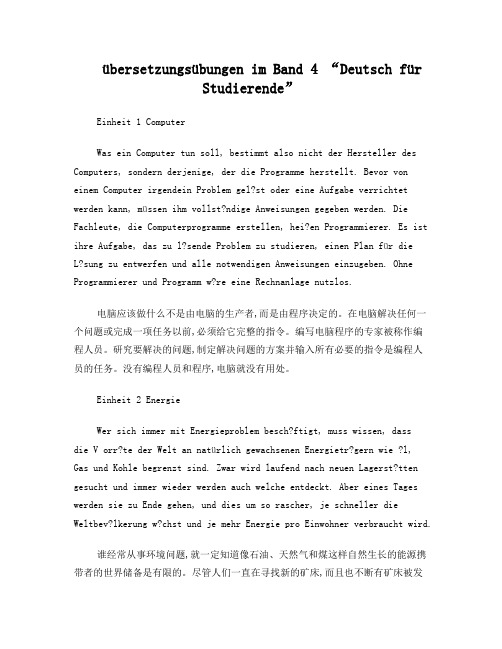
übersetzungsübungen im Band 4 “Deutsch fürStudierende”Einheit 1 ComputerWas ein Computer tun soll, bestimmt also nicht der Hersteller des Computers, sondern derjenige, der die Programme herstellt. Bevor von einem Computer irgendein Problem gel?st oder eine Aufgabe verrichtet werden kann, müssen ihm vollst?ndige Anweisungen gegeben werden. Die Fachleute, die Computerprogramme erstellen, hei?en Programmierer. Es ist ihre Aufgabe, das zu l?sende Problem zu studieren, einen Plan für dieL?sung zu entwerfen und alle notwendigen Anweisungen einzugeben. Ohne Programmierer und Programm w?re eine Rechnanlage nutzlos.电脑应该做什么不是由电脑的生产者,而是由程序决定的。
在电脑解决任何一个问题或完成一项任务以前,必须给它完整的指令。
编写电脑程序的专家被称作编程人员。
研究要解决的问题,制定解决问题的方案并输入所有必要的指令是编程人员的任务。
没有编程人员和程序,电脑就没有用处。
Einheit 2 EnergieWer sich immer mit Energieproblem besch?ftigt, muss wissen, dassdie V orr?te der Welt an natürlich gewachsenen Energietr?gern wie ?l,Gas und Kohle begrenzt sind. Zwar wird laufend nach neuen Lagerst?tten gesucht und immer wieder werden auch welche entdeckt. Aber eines Tages werden sie zu Ende gehen, und dies um so rascher, je schneller die Weltbev?lkerung w?chst und je mehr Energie pro Einwohner verbraucht wird.谁经常从事环境问题,就一定知道像石油、天然气和煤这样自然生长的能源携带者的世界储备是有限的。
简析动词lassen的用法
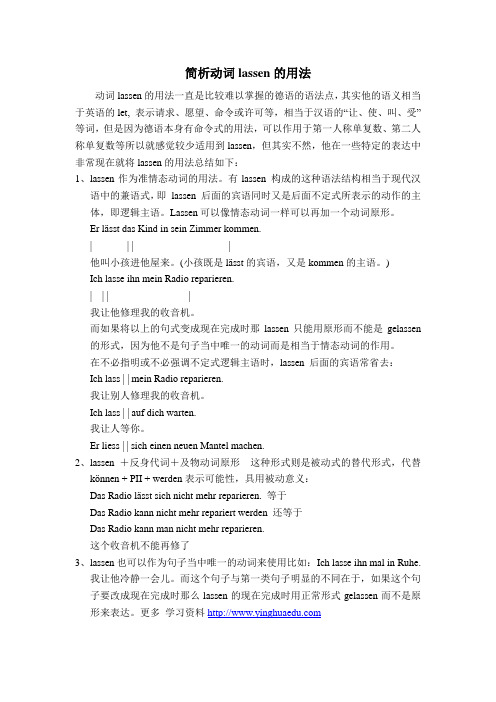
简析动词lassen的用法动词lassen的用法一直是比较难以掌握的德语的语法点,其实他的语义相当于英语的let,表示请求、愿望、命令或许可等,相当于汉语的“让、使、叫、受”等词,但是因为德语本身有命令式的用法,可以作用于第一人称单复数、第二人称单复数等所以就感觉较少适用到lassen,但其实不然,他在一些特定的表达中非常现在就将lassen的用法总结如下:1、lassen作为准情态动词的用法。
有lassen 构成的这种语法结构相当于现代汉语中的兼语式,即lassen 后面的宾语同时又是后面不定式所表示的动作的主体,即逻辑主语。
Lassen可以像情态动词一样可以再加一个动词原形。
Er lässt das Kind in sein Zimmer kommen.|_______| |___________________|他叫小孩进他屋来。
(小孩既是lässt的宾语,又是kommen的主语。
)Ich lasse ihn mein Radio reparieren.|__| |________________|我让他修理我的收音机。
而如果将以上的句式变成现在完成时那lassen只能用原形而不能是gelassen 的形式,因为他不是句子当中唯一的动词而是相当于情态动词的作用。
在不必指明或不必强调不定式逻辑主语时,lassen 后面的宾语常省去:Ich lass | | mein Radio reparieren.我让别人修理我的收音机。
Ich lass | | auf dich warten.我让人等你。
Er liess | | sich einen neuen Mantel machen.2、lassen +反身代词+及物动词原形这种形式则是被动式的替代形式,代替können + PII + werden表示可能性,具用被动意义:Das Radio lässt sich nicht mehr reparieren. 等于Das Radio kann nicht mehr repariert werden 还等于Das Radio kann man nicht mehr reparieren.这个收音机不能再修了3、lassen也可以作为句子当中唯一的动词来使用比如:Ich lasse ihn mal in Ruhe.我让他冷静一会儿。
Einheit 6情态动词的主观用法

um/kippen 弄翻,弄倒 die Briefmarke –n 邮票 verschwinden 消失 verschwunden (s) der Durst 口渴 ungewhnlich不寻常的 das Viertel- (城市中的一 个) 区 der Besitzer – 物主,所有者 das Gerusch –e声响,噪声, 噪杂声 Wecken vt. 叫醒 die Tat 行为,行动 in der Tat 事实上
muss –sicher / mit Sicherheit müsste – sehr wahrscheinlich dürfte – wahrscheinlich werden – wahrscheinlich, wohl knnte (kann) – mglicherweise, vielleicht mag – mglicherweise, vielleicht soll – Man sagt... / Ich habe gehrt... will – Er behauptet... / er sagt (selbst) ...
soll – (Wahrscheinlichkeit unbekannt )(据说) (据说)
Herr Müller soll drei Jahre bei Siemens gearbeitet haben. Man sagt, dass Herr Müller drei Jahre bei Siemens gearbeitet hat. Ich habe gehrt, dass,
Sagen Sie anders.
Er ist sicher zu Hause. Er muss zu Hause sein. Die Frau hat bestimmt Deutsch gelernt. Die Frau muss Deutsch gelernt haben. Er ist sicher nach Hause gefahren. Er muss nach Hause gefahren sein. Du hast dich sicher gut erholt. Du musst dich gut erholt haben. Er hat sicher die Telefonnummer von dem Professor. Er muss die Telefonnummer von dem Professor haben.
前缀总结

前缀ver-的作用有:1:表示动作的完善,突出表现在那些具有地点概念的动词中,例如: heilen(医治)-- verheilen(治愈) reisen(旅行)-- verreisen(外出旅行) wehen(飘)-- verwehen(吹走)2:有加工、完善的意思。
例如:arbeiten(工作)-- verarbeiten (加工) mauern(砌砖)-- vermauern (用砖砌没) 3:使……变成……,成为……例如:Film(电影)-- verfilmen (被拍摄成电影) Dunst (蒸汽)-- verdunsten (蒸发,成为蒸汽) Waise (孤儿)-- verwaisen (变成孤儿) Stein (石头)-- versteinern (变成石头)另外还有一部分形容词也可变成动词例如:deutlich -- verdeutschlichen (使明了) edel (贵重的) --- veredeln (精炼,精制) arm (贫穷的) ---- verarmen (变穷) stumm (哑)-- verstummen (变哑)4:表示一个动作的渐渐终止例如: verklingen (声音逐渐微弱以至消失) verhallen (回响逐渐变轻以至消失) verschwinden (消失)5:表示动作的错误例如: drehen (旋转)-- verdrehen (扭曲) kennen (认识)--verkennen (误认) laufen (走,跑)-- sich verlaufen (迷路) rechnen (计算)-- sich verrechnen (算错) sehen (看)-- sich versehen (看错)6:表达坏事或者不良感觉 verpesten (污染) verseuchen (传染流行病) versalzen (放盐过多)7:加扩展后缀-lichen 构成的动词例如: veröffentlichen (发表) vereinheitlichen (统一) 8:把名词变为动词Kork (软木塞)--verkorken (用软木塞塞住) Gold (金)-- vergolden (镀金)前缀be-的作用1:使不及物动词变为及物例如:antworten (auf) -- beantworten (回答) zweifeln (an) -- bezweifeln (怀疑)2:使及物动词的支配关系发生变化,有人三物四的支配关系变为人四物三例如: j-m Waren liefern -j-n mit Waren beliefern (送货给某人) 3:由名词be - 构成的动词表示用词干所表述的东西装在某物上例如: die Flagge --beflaggen (用旗来装饰) das Bild -- bebildern (给……配图) die Fracht -- - befrachten (给……装上货物)由此引申出来的词还有: beglücken (使……感到幸福) beauftragen (委托) beruhigen (使安心) belustigen (使开心)los是英语中的less,lich是ly的意思(表adj或者adv) ab-表示脱离,离去:abfliegen(起飞,飞走), abgeben(交出), abfließen(流出,流去), abziehen (拉去,除去),abnehmen(拿去)表示向下: absteigen(下降,下车), abspringen(跳下)表示过程的中止:abbrennen(烧光),abnutzen(用久,用坏),abkühlen(冷却下去)表示照搬: abmalen(临摹),abschreiben(抄下)表示取消: abbestellen (取消预定), abmelden(注销), abrüsten(裁军)表示降低,减少:abnehmen, absenken, (非德语德国网站授权禁止转载)an-一般以an为可分前缀的东西都是及物动词。
- 1、下载文档前请自行甄别文档内容的完整性,平台不提供额外的编辑、内容补充、找答案等附加服务。
- 2、"仅部分预览"的文档,不可在线预览部分如存在完整性等问题,可反馈申请退款(可完整预览的文档不适用该条件!)。
- 3、如文档侵犯您的权益,请联系客服反馈,我们会尽快为您处理(人工客服工作时间:9:00-18:30)。
Umweltschutz und ich
lassen
• lassen a-ä ließ gelassen
• Ich lasse mein Buch auf dem Tisch. • Die Eltern dürfen die kleinen Kinder nicht allein zu
Was passt zusammen?
• den Wasserhahn
• trinken
• dmweltfreundliche Waschmittel • Zudrehen
• wiederaufladbare Batterien
• bringen
• vorsichtig mit der Umwelt
• Ich habe gehört, dass die Mutter ihr Kind Hausaufgaben hat machen lassen.
• Ich habe gehört,...
情态助动词ቤተ መጻሕፍቲ ባይዱ成时
• können - gekonnt dürfen - gedurft
• wollen - gewollt • sollen - gesollt
Computer spielen. • GÜ2, 3 • Der Chef arbeitet nicht. Er lässt... • Der Lehrer macht die Übung nicht. • Der Vater kocht nicht. • Die Frau räumt die Wohnung nicht. • Wir waschen die Wäsche nicht. • Er kauft nicht ein.
• Gestern haben wir das gelassen.. • Er hat das gelassen.
• GÜ 1
• Die Mutter lässt ihr Kind Hausaufgaben machen. • Der Chef lässt die Sekretärin eine E-Mail schreiben. • Die Mutter lässt den Sohn nur eine Stunde
• Mein Freund hat Computer gespielt. Aber ich habe das nicht gedurft.
• Ich bin nicht ins Kino gegangen. Ich musste Hausaufgaben machen.
• Ich bin nicht ins Kino gegangen. Ich habe Hausaufgaben machen müssen.
• die Umwelt • der Umweltschutz • die Umweltverschmutzung • umweltfreundlich • umweltschädlich • der Umweltkiller
• der Müll • der Sondermüll • der Restmüll • die Mülltonne
• werfen
• leere Batterien zu einer Sammelstelle• vermeiden
• das kostbare Süßwasser nicht
• Ich habe mein Buch auf dem Tisch gelassen.. • Die Eltern haben die kleinen Kinder nicht allein zu
Hause gelassen. • Er hat das Kind nicht auf die Straße gelassen.
• Die Mutter hat ihr Kind Hausaufgaben machen lassen.
• Der Chef hat die Sekretärin eine E-Mail schreiben lassen.
• Die Mutter hat den Sohn nur eine Stunde Computer spielen lassen.
machen müssen. GÜ 5 Vokabeln und Text
Bilden Sie neue Wörter
• das Wasser • z.B. das Süßwasser • das Trinkwasser • das Mineralwasser • der Wasserhahn • die Wasserknappheit • das Wassersparen • das Meerwasser / das salzige Meerwasser • das Erdwasser
Hause lassen. • Er lässt das Kind nicht auf die Straße.
• Lassen wir das. Wir können das Problem sowieso nicht lösen.
• Lass das. Morgen machen wir das weiter.
• Das Kind musste lernen. Es durfte nicht Computer spielen
• Das Kind hat lernen müssen. Es hat nicht Computer spielen dürfen.
• GÜ 4 • Ich habe gehört, dass das Kind Hausaufgaben hat
müssen - gemusst
• Mein Freund ist ins Kino gegangen. Aber ich konnte das nicht.
• Mein Freund ist ins Kino gegangen. Aber ich habe das nicht gekonnt.
• Mein Freund hat Computer gespielt. Aber ich durfte das nicht.
